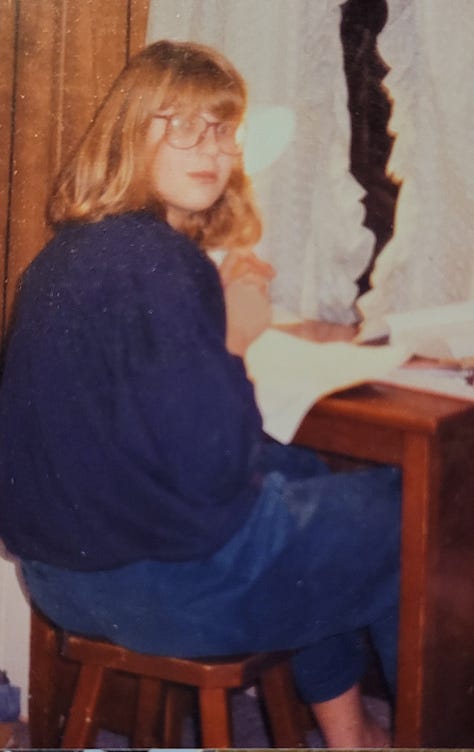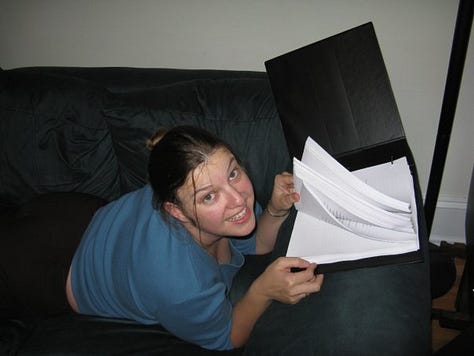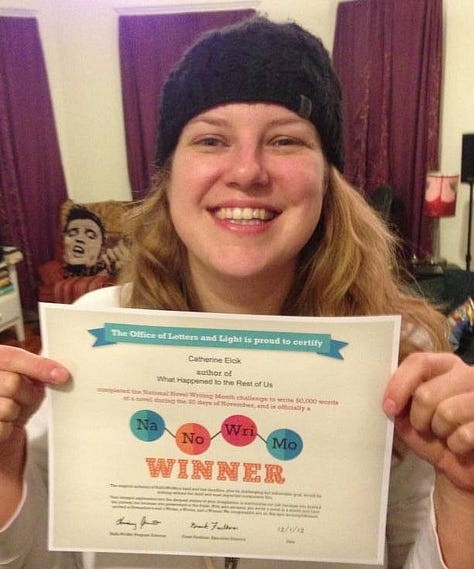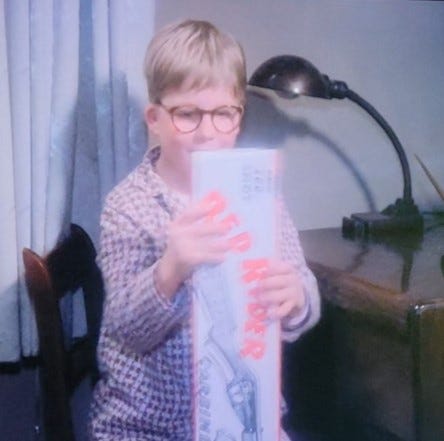A Christmas Story as A Writer's Story
Tenacity Tale: On Wanting a Red Ryder BB Gun with a Compass in the Stock and this Thing That Tells Time.
Tenacity Tales is HIBOU’s monthly celebration of the tiny tenacities in a writerly life. We’re currently planning our Tenacity Tales for 2024, so if you have a tenacity tale you’d like to share, comment below or send me your pitch at hibou@substack.com. To learn more about what we’re looking for, read the original Tenacity Tale here.
When I was a kid, TNT played a 24-hour marathon of the 1983 holiday classic A Christmas Story on repeat on Christmas Eve, and my parents put it on in the background during my family’s open house for the neighbors.
If you’ve never seen the movie here’s what you need to know: In a working class town of Hohman, Indiana, 9 -year-old Ralphie Parker is hoping for a very special Christmas gift—a Red Ryder BB gun with a compass in the stock and this thing that tells time, to quote from Ralphie’s essay about what he wants for Christmas, in fact—but everyone he shares his wish with—his mom, his teacher, and Santa himself—tells him he’ll shoot his eye out.
On Christmas afternoon, long after the presents have been torn open, Ralphie sits on the couch forlorn that there hadn’t been a BB gun under the tree for him. But then the old man spots one present that “Santa” had tucked behind the desk and in a full-blown Christmas miracle, it’s a a Red Ryder BB gun for Ralphie!
Other shenanigans ensue—A Christmas Story is a movie cobbled out of the vignettes of Jean Shepherd by the director who brought us Porky’s, after all—but that’s the basic gist.1
Which is all well good, but this is a Tenacity Tale not a movie review, so let’s get on with it, shall we?
Watching the film through a tenacity tale’s filter, A Christmas Story leaves us with no shortage of models:
There’s director Bob Clarke pestering MGM to let him make Jean Shepherd’s work into a movie then—when MGM tosses him peanuts to shut him up2 —sinking his cut back into production.
There’s the old man character who dreams of a better life, enters contest after contest, and finally wins a major award!
And then there’s the entire Parker family who—when the neighbor’s hounds storm into the house and gobble up their Christmas turkey—find an open Chinese restaurant and enjoy a roasted duck they dub a Chinese turkey.
Good candidates, all, but the tenacity tale from A Christmas Story that interests me most is Ralphie Parker’s indefatigable desire for that Red Ryder BB gun with a compass in the stock and this thing that tells time.

I know the BB gun in A Christmas Story wasn’t intended as a metaphor about publication, but if there’s a better symbol for my desire to finally get a book published, I don’t know what it is!3 Elsewhere this year I’ve talked about the intrinsic value of writing regardless of whether it’s ever published (see “The Work is the Way” and “Your Writing Matters”), but I’ve also been honest about the fact that even as I embrace these ideals, I still want to be published.
Like, really want to be published.
Like, there’s a 9-year-old Ralphie Parker inside me grinning at anyone who’ll listen to me explain how much I want a breathtaking-two-book-deal-with-a-big-five-publisher-who-kicks-ass-and-a-publicist-who-takes-names.
Recently I was talking through my 2024 goals with my writing friend, Evelyn Starr.
Traditionally I let myself dream through most of December, playing an elaborate month-long version of what if with my life.
Normally, I love this part of the year when anything seems possible, this brainstorming period a green light for my inner dreamer to go as wild as a dog off leash at a park, tearing around free, free, free.
Basically, my inner dreamer spends most of December doing brain zoomies.
This year, though, my brainstorming has been more ginger than joyfully unhinged, partly because I’m muddling through the grief that comes with the first Christmas season without both of my parents4 and partly because 2024 will mark a big professional transition, and I’m a dog who approaches the unknown not by zooming forward but by sniffing around cautiously and—if I’m being totally honest here—whimpering.
Because of that, I was telling Evelyn how grateful I was for the the one goal I have absolute clarity on: my deep desire to—
—finish revising my novel.
Evelyn laughed.
“The entire time I’ve known you,” she said, “getting a novel out has been the one goal you’ve been clearest about—like your heart is this great big shining light pointed right at the goal of getting a novel out into the world.”
Which seems to me a whole lot like Ralphie’s obsession with the Red Ryder BB gun, except—unlike Ralphie—I won’t find my heart’s desire gift wrapped under the tree on Christmas morning. My gun will be forged not from steel but from ink, paper, and hours upon hours (upon hours) of hard work.
The point of this month’s tenacity tale, dear reader, is not to laud a fictional nine-year-old for doggedly holding onto his BB-gun dream. The point isn’t even to pat myself on the back for holding onto my publication dreams over decades of near misses and long odds.



The point of this tenacity tale is to pen a love letter to all the writers who hope they’ll be published one day, but—with no guarantee that will ever happen—write anyway.
Write for the love of it.
Write as if the writing itself is the Red Ryder BB gun with a compass in the stock and a thing that tells time.
I’m currently about three quarters through The Hidden Life of Aster Kelly by Katherine A. Sherbrooke, a novel that’s reads (so far) like The Seven Husbands of Evelyn Hugo, but with an added pinch of 1970s Broadway.
When we meet Lissy Horowitz, she’s waiting on a call about whether she’s landed a leading role in a Broadway musical and thinking about all the times she’s nearly thrown in the proverbial towel:
Sure, she’d gotten a few small roles Off Broadway, and even a company part in a larger production, but nothing she could make a profession of yet. She had no way to know if a real career would ever materialize. It was like being in a never-ending maze with no map to tell her if she was one turn away from success or still stuck somewhere near the beginning. Would turning back be the safer bet or a foolish decision after the strides she’d already made, no matter how small?
Most writers I know are right there with Lissy Horowitz in that maze, worried and unsure.
But many of them—so many it takes my breath away—are also Ralphie Parkers holding onto the dream that one day they’ll finally have Red Ryder BB guns to call their very own.
I dedicate this tenacity tale to all the Lissys and Ralphies out there writing and writing (and writing) toward a singular publishing dream they have no way of knowing will ever materialize.
Happy dreaming, you beautiful writers, you.
Happy writing.
Here’s to all of us one day finally holding the Red Ryder BB gun of our wildest writerly imaginings.
If you want a more nuanced look at the plot of the movie and how it clawed into America’s collective Christmas subconscious, read Sam Kashner’s “How A Christmas Story Went from Low-Budget Fluke to an American Tragedy”.
I’m paraphrasing and (over) simplifying, obviously.
Look, I’m aware this is an imperfect metaphor, but it’s Christmas so play along, would you?
Technically 2022 marked the first Christmas without my parents, but I made a conscious decision to spend that Christmas somewhere that was as beautiful as it was divorced from our family traditions. But this year we’re home and grief has felt a little like an ocean tide that follows no chart.





